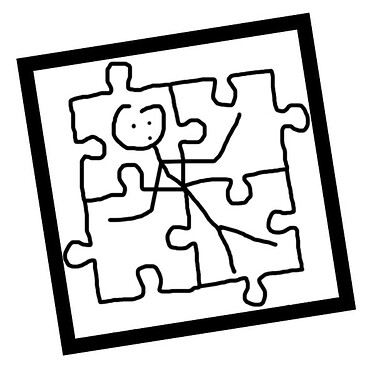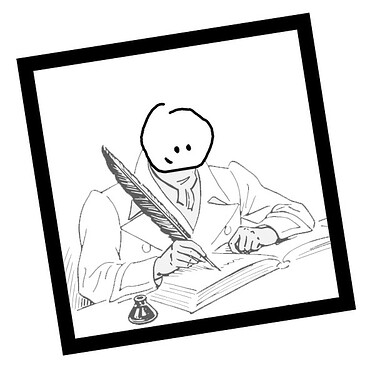5.8.- Difficulties of Puzzles
At that point I must say that as far as I know, only one person, one of the beta testers, was able to arrive at the final puzzle screen without asking for help.
As he told me, it was because he thought that the only help available was the standard replies of Gent Stickman to your actions and didn’t know about the specific “help” command. I was really impressed by that because I thought the puzzles were not easy at all, and that fact made me think that perhaps the game was too easy.
Other testers had difficulties in different points. As I already said one of them asked for help in the “Main Door” puzzle, as although he had read Lord of the Rings, he didn’t remember about that kind of door riddle. This also shows me that things that are obvious for some people or at some moment, are impossible for others to solve without help.
From here is where I understood the need of a solid help system, that I will discuss later. After the game released, some users talked about very high difficulty (even “Darksoulish” one), while others talked about the game being too easy. I think that difficulty is a subjective question (and in fact something not measurable with just a scalar value), and in this game depends also on how much you are ready to use the help system.
My general and personal evaluation about this after seeing people play is that the game is difficult but not too much. Many people use the help system perhaps too soon as what they were trying was mainly very near to the solution, and perhaps investing some little more time on each puzzle would lead them to find the solution.
So, I think that the difficulty of this game is not something that needs to be fixed, at least in a general way. You can like or not this kind of game, of course. Some academics (Jesper Juul and Marleigh Norton, 2009) see videogames and poetry as being related, as expressive forms that have part of their aesthetic value in the effort required to advance in their structure. The same way, there are people that like or don’t like poetry and cryptic language and meanings in for example songs.
Under a more pragmatic point of view, I tried moving away the puzzles different from the kind of ones recognizable for me as bad or boring (localized instead of universal, show clues only once without a way to check again, essay and error without a further logic, requirement of an specific physical interface, and of course trying to avoid pixel hunting/guess the verb).
While I created each puzzle I tried to adhere to these five main principles:
-
Have clear objectives: The puzzles must be there for a narrative reason that the player must understand, so he has something to solve.
-
Process signposted with feedback: The player should not be required to read the designer’s mind. Information in the game should set the basis of what is required, and failed interactions and unfocused actions from players should generate output trying to lead him in the right direction.
-
Solving things has consequences: Puzzles must be there to advance in the story. That’s a specific application of a more general rule for narrative: Things happen to advance the story in some way.
-
Avoid repetitive or boring things: I personally hate the kind of games where you are a mighty warrior but have to act as a errand boy bringing stupid things from point A to B, or collecting things. That’s my point of view for this rule, but the rule should work for other people with their own vision of what is cool and what is not.
-
Check player`s feelings after resolving: Try to get myself into the player’s shoes and try to understand how he will feel after resolving the puzzle. If I can imagine him saying things like “Are you kidding me?” instead of “Wow! How clever I am!”, the shot was missed with that puzzle. Obviously not everybody will feel the same, but I think that unfair puzzles are more easily discovered with this rule.
While creating the puzzles as a set, I tried to make them different from each other, each one falling into a different category to avoid being boring or repetitive:
1 Apple:
Get something from somewhere that the player knows (or can suppose through basic interaction).
2 Pit:
Go though some physical barrier (mainly using elements in the scenery, perhaps in an uncommon way).
3 Door:
Classical word enigma question.
4 Final Boss.
Use all that I have or have seen to solve the situation, sometimes in a trial and error way, as in many graphic adventures with combinations of “use A with B”.
I think that the puzzles in this game can be more or less difficult, but they are not unfair. Some possible solutions to them would be unfair I think, such as allowing Gent Stickman to fly over the pit, if nothing in the game says he can fly (some people tried, and this try has its own answer).
Some people could see as unfair the “pee situation” but after all, the guy doing it is Gent Stickman and we all know where he comes from. Perhaps I will fine tune the final puzzle, but I’m pretty satisfied with the result, and I think that no other puzzles could match better with the story and the motivations I have for each one. I will not implement any additional ones in the new version of the game, but if you have some ideas for puzzles and want to share them with me, I would love to hear them.

